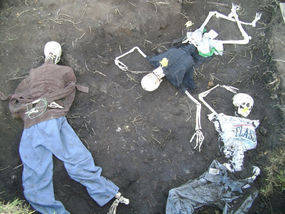Forensic Anthropology Information
Job Description, Education & Salary
|
Get FREE Info From Schools |
Looking for Forensic Anthropology information? Start here with our forensic anthropologist job description, college reviews & the salary of Human Osteologists.
The study of human remains in a legal setting is called forensic anthropology. While the forensic anthropologist may work with a variety of materials, most often it is a human being’s bones that are investigated.
Anthropology, in essence, is the investigation of people. When you add in the category of forensics, this becomes a profession dealing with criminal law.
Osteology, or the study of bones, plays a big role in many legal cases. Determining the age, identitiy, or physical condition of human remains by looking at their bones is a major factor in the forensic anthropology sector of criminal justice.
But what exactly is this particular scientist’s duty? How do you become a one? And how much does it pay? These are all great questions to ask before making your decision to join the world of forensic anthropology.
Forensic Anthropology Job Description
Working with various law enforcement agencies, law firms, or private employers, the forensic anthropologist is charged with studying human remains to determine the who, what, where, and how of many legal cases—especially older ones in which physical evidence is hard to come by.
 |
There are many tools the forensic anthropologist uses to make these determinations. Some of these include:
- DNA analysis
- Blood group study
- Fingerprint technology
- Bone measurements
But the human brain is perhaps the best tool of all.
Only with significant education and training can a forensic anthropologist be a true success in the field.
Forensic Anthropology Information: Education & Degree Needed
Like many specialized fields of criminology, forensic anthropology requires a great deal of instruction. If you are thinking about heading down this career path, you’ll need to get a college degree or two…or even three!
First of all, before anything else, you need to decide if this is something you really want to do. Forensic anthropology is going to take many years of schooling, which requires a great deal of determination, strength, and perseverance from you.
And even beyond schooling, your resolve is going to be tested. Because this isn’t a high demand profession, there aren’t very many job openings for forensic anthropologists. This means that you’ll have to fight for your career every step of the way—or at least until you can find a toehold in the industry.
 |
So, still want to give it a shot? Good!
Your next step is earning an undergraduate degree in biology, anatomy, chemistry, physiology, or anthropology—basically anything in the biological sciences that will give you a solid foundation for your future career.
In addition to your major courses, you’ll want to take some electives in forensics and criminal justice for an introduction to the legal system.
Once you’ve earned your bachelor’s degree—which can be done cheaply and easily from an online college or university—you have to look at getting an advanced degree. You may be able to find an apprenticeship with merely a bachelor’s degree, but you can’t fully join the profession without a master’s.
Your graduate degree should be in human biology or anthropology, with an emphasis in forensics.
You can certainly join the field at this point, with a bachelor’s and master’s degree in hand, but if you want to rise to the top of the profession, you’ll want to think about going a step further and getting your PhD.
This is an extremely competitive field, so the more qualified you are for the job, the more likely you’ll be to snag the best position.
Forensic Anthropology Information: Salary
You have a couple of options before you at this point: join the professional or academic worlds.
As a professor of forensic anthropology you can expect to make an average of $35,000 to $50,000 annually at first, with the chance to make upwards of $100,000 when you’ve reached the pinnacle of success.
As a professional, working in the field, your average salary will be approximately $75,000 to $90,000 per year.
To learn more about the academics of forensic anthropology, we highly recommend checking out Dr. Midori's professional page.
|
Get FREE Info From Schools |
Return from Forensic Anthropology Information to Forensic Jobs
Return from Forensic Anthropology Information to Criminal Justice Careers





